India will witness the first lunar eclipse of 2020 on Friday, January 10 at 10:37 pm. During the penumbral lunar eclipse, the Earth will block some of the sunlight from reaching the Moon and only the outer shadow will fall on the Moon. A penumbral lunar eclipse takes place when the Sun, the Earth, and the Moon are imperfectly aligned and usually this eclipse is mistaken as a full moon.

However, the interesting part now is that this is not just the lunar eclipse, but we will also be looking at the Wolf Moon. The Wolf Moon will occur simultaneously with the lunar eclipse for skywatchers watching across the globe.
The lunar eclipse, known as chandra grahan, will be visible from India, also from Europe, Asia, Australia, Africa, Pacific, Atlantic, Indian Ocean, and Arctic region. North America and the eastern part of South America will also witness the first lunar eclipse of this year.
The Chandra Grahan will last for at least 4 hours and will end around 2.42 am on Saturday, January 11.
This year, six eclipses will occur. Four lunar eclipses will happen on January 10, June 5, July 5 and November 30 and two solar eclipses will take place on June 21 and December 14.
Dos and don't
- During the lunar eclipse, it is said that cooked food decays faster during the chandra grahan. Thus, a person is asked to not consume food during the time of the eclipse.
- Also, the food eaten during the time of the lunar eclipse would not provide quality nutrients and might lead to inertia.
- Avoid cooking during the eclipse or Chandra Grahan phase.
- The lunar eclipse is not an auspicious time to perform any holy rituals.
- People can chant Sanskrit chants and mantras which will help them to keep negative energy away during the Chandra Grahan.
- Pregnant women should stay indoors at the time of the lunar eclipse and also stay away from using knives and sharp objects as it may lead to birthmarks.
What is lunar eclipse?
A lunar eclipse occurs when the three bodies -- the Sun, the Earth, and the Moon are aligned in a line and the Earth is between the Sun and the Moon obstructing the sunlight from reaching the Moon. The lunar eclipse of January 10 will be a "penumbral eclipse" where the Moon moves through the faint, outer part of Earth's shadow.
Recently, we got over the solar eclipse and now there's another. The country observed an annular solar eclipse last year in December that created a 'ring of fire' in the sky.
(With agency inputs)

















